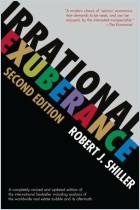Join getAbstract to access the summary!

Join getAbstract to access the summary!
Jonathan Adair Turner
Promoting Economic Stability
Managing the Unstable Relationship Among Banks, Investment and Innovation
World Economic Forum, 2014
What's inside?
In financial markets, irrationality often trumps rationality in investment decisions.
Recommendation
According to neoclassical economic theory, market participants should behave rationally in their pursuit of positive investment outcomes. But this is not the case in reality, and Jonathan Adair Turner explains why in this brief World Economic Forum IdeaLab talk. getAbstract recommends Turner’s basic lesson to neophyte investors who wish to learn how financial markets tick and prescribes his provocative discussion topic to market analysts and policy makers seeking a more stable, less crisis-prone financial system.
Summary
About the Speaker
Jonathan Adair Turner of the Institute for New Economic Thinking is also a member of the Bank of England’s Financial Policy Committee.




















Comment on this summary